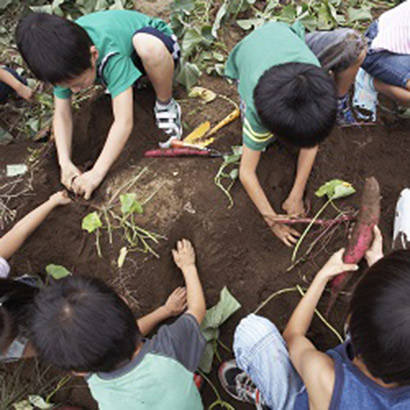
Iowa City’s community garden program is located in Wetherby Park, a city park that serves neighborhoods in the southeastern end of the city. These neighborhoods are predominantly low income and multi-ethnic. The park is in the center of this area and is within walking distance for most residents. There are a large number of garden plots in the park for which neighborhood residents pay $20 in rental a year.
The NRPA grant enabled the Parks and Recreation department to establish the children’s gardening program this past summer. The gardening program is part of two county-operated day-camps, one of which is at a community center near the park while the other is at an elementary school in another area of the city. The goals are to educate the children about nutrition, increase their sense of connection to nature, and to improve their self-esteem by working hard and reaping the rewards. The children worked in both an annual and a perennial garden. About 60 children between the ages of 6 and 10 worked in the garden this summer. The program was launched with the help of partnerships with two local nonprofits that focus on environmental sustainability. One partner is Backyard Abundance, which offers environmental education and landscaping by their volunteers. Backyard Abundance helped to build a perennial garden in the park with the summer campers that came to be known as the Edible Forest Maze. Using permaculture techniques, it is planted with strawberries, chokeberries, and apple and nut trees. Another partner, Summer of Solutions, is a national organization of high school and college students with a branch in Iowa City. Student volunteers take on projects during the summer that work toward environmental sustainability.
The garden staff is planning an end-of-summer event in August to showcase the garden. The children will act as “Garden Ambassadors,” talking about what they’ve grown and showing off some of the harvest to parents and others.
In addition to the children’s garden, Wetherby Park also has three raised beds for adults with physical disabilities. The garden is part of the park’s adaptive recreation program and was built this summer with funds from the NRPA grant. Food grown in this and the children’s garden will be used for a dinner at the end of the summer.
The garden staff has thought through how to sustain their program in the future. The perennial garden, once it is established, will require little maintenance because of the permaculture methods that Backyard Abundance used to plant it. Seeds and plants will be purchased through the playground budget. Volunteers from Summer of Solutions and Americorps will help the children plant and maintain the garden. As Gabi MacKay, one of the two Grow Your Park Environmental Education Coordinators, commented, “… we may not even need to have a permanent staff member out there. We may get it done through all volunteers”, with oversight provided by the playground coordinator.
As in all gardens, the Wetherby Park children’s garden has faced a few challenges. The raised beds used in the adaptive gardening program, which are next to the parking lot, have been vandalized several times. The Parks and Recreation department posted signs in response. Another challenge was access to water for the perennial garden. The annual garden is located in the community garden area, so there is an available water line. However, the perennial garden is at least 400 yards away and water had to be transported in buckets until the city extended water lines.
Along with challenges, the garden has also had significant successes. For Ms. MacKay, one of the big successes is, “… just the fact that we built a perennial garden. That was a huge amount of work and the fact that we got all the plants in, for the most part, is pretty amazing. In terms of the kids, every time I go out to the park, someone is asking me, ‘Are we planting today? Can I help water?’ So just that kids even are aware of it and they are sharing with me more of their eating habits, what they like about food, what they don’t like about food. I think they feel confident that they can do gardening on their own. … I just think they are feeling much more confident in the garden and they are very helpful.” Approximately 20% of the children who work in the garden have behavior problems and nearly 5% are on the autism spectrum. The garden staff has observed that working in the garden seems to help some of those children, giving them a focus and a goal. Some even want to go back to the garden in the afternoon after working in it all morning. The garden seems to have a more beneficial effect on younger children with behavioral problems than with the older children.
